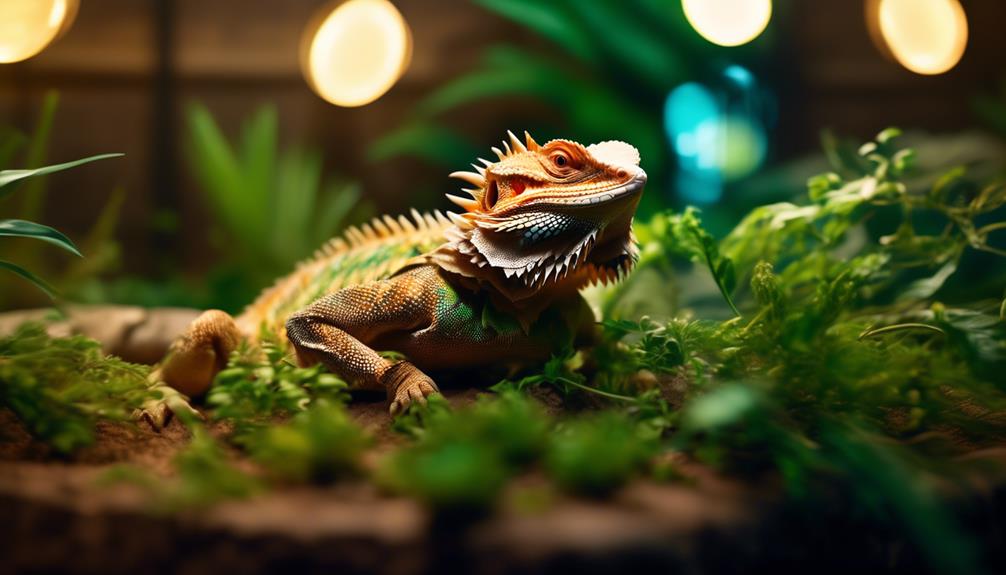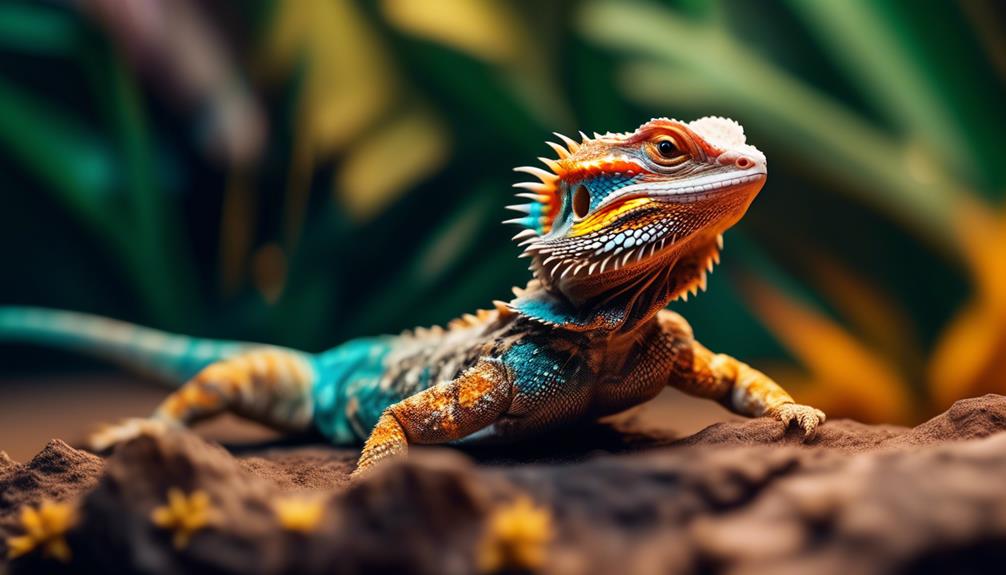Have you ever wondered what it takes to keep your bearded dragon lively and healthy? Well, look no further!
In this discussion, we will uncover the key to maintaining a vibrant and active bearded dragon. By understanding the importance of providing a stimulating environment, a balanced diet, and regular exercise, we can ensure that our scaly friends thrive and enjoy a high quality of life.
So, let's explore the secrets to keeping our bearded dragons happy and full of energy!
Key Takeaways
- Regularly monitor the behavior and appearance of your bearded dragon to ensure they are alert, energetic, and showing no signs of weakness or favoring one side.
- Proper oral health care is crucial for bearded dragons, including regular dental checks to identify any signs of decay or abnormalities. Healthy teeth, a glossy pink tongue, and pink gums are indicators of optimal oral health.
- Close observation and recognition of abnormalities or signs of unhappiness in your bearded dragon are important. Make necessary adjustments in care and seek veterinary attention for persistent or concerning changes.
- Prevent and address health issues by monitoring behavior for unusual changes, addressing common ailments like respiratory infections and metabolic bone disease, and practicing good hygiene to prevent health issues from arising. Regular veterinary check-ups are also essential for preventive care and early detection of any health problems.
Signs of a Healthy Bearded Dragon
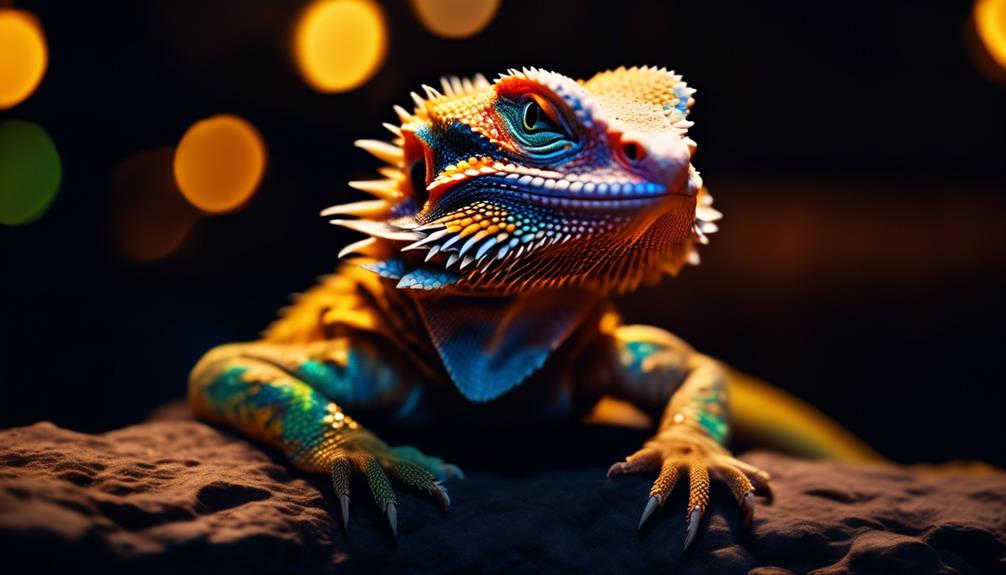
When assessing the health of a bearded dragon, there are several key signs to look for.
Behavioral cues are an important indicator of their overall well-being. A healthy bearded dragon should be alert and energetic, with a bright-eyed appearance. They should have plenty of energy and be active, not wanting to sleep excessively.
Physical health is also crucial. They should be able to support their weight and use all four limbs. Holding their head up without difficulty is a good sign, as well as having plump fat pads and no discoloration in their scales. A full base of the tail and the absence of protruding hip bones are also positive signs.
Regular check-ups are important to ensure their continued health and to identify any potential issues early on. By observing their normal behavior and appearance, we can recognize any abnormalities or changes that may indicate unhappiness or health problems. Making necessary changes in their care and seeking veterinary attention when needed are essential in maintaining their well-being.
Physical Health Indicators
Physical health indicators for a bearded dragon can provide valuable insight into the overall well-being of the reptile. When assessing the physical health of a bearded dragon, there are certain indicators to look out for. These indicators include weight support and limb usage.
A healthy bearded dragon should be able to support its weight properly, without any visible signs of difficulty or discomfort. Additionally, all four limbs should be actively used, with no signs of weakness or favoring of one side.
Observing these physical health indicators can help ensure that your bearded dragon is in good shape and able to move around comfortably. By paying attention to weight support and limb usage, you can ensure the overall physical well-being of your bearded dragon.
Oral Health Care
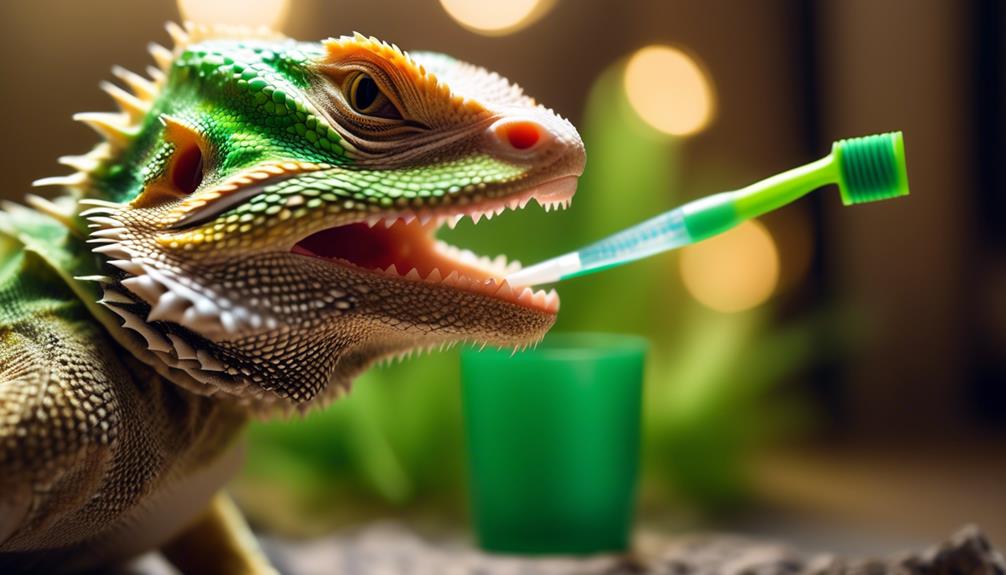
Taking care of a bearded dragon's oral health is essential for ensuring its overall well-being. Dental care for bearded dragons is just as important as other aspects of their health. Regular oral health checks play a crucial role in maintaining the dragon's vibrant and active lifestyle.
By examining the dragon's mouth, we can identify any signs of decay or abnormalities that may indicate oral health issues. Healthy bearded dragons should have natural off-white teeth, a glossy pink tongue (with a white tip), and healthy pink gums.
Regular oral health checks allows us to catch any problems early on and take appropriate action, ensuring that our bearded dragons maintain optimal oral health. By prioritizing dental care and regular checks, we can help our dragons stay healthy and live their best lives.
Observing Changes and Seeking Help
To ensure the overall well-being of a bearded dragon, it's crucial to closely observe any changes and seek help when needed. Recognizing abnormal behavior and identifying any changes in appearance or habits is essential for maintaining the health of your pet.
By getting to know your dragon's normal behavior and appearance, you can quickly identify any abnormalities or signs of unhappiness. Making necessary adjustments in their care, such as changes in diet or habitat, can help address any issues.
However, if you notice persistent or concerning changes, seeking veterinary attention is vital. Regular check-ups with a reptile veterinarian are also important for preventive care and early detection of any potential health issues.
Preventing and Addressing Health Issues
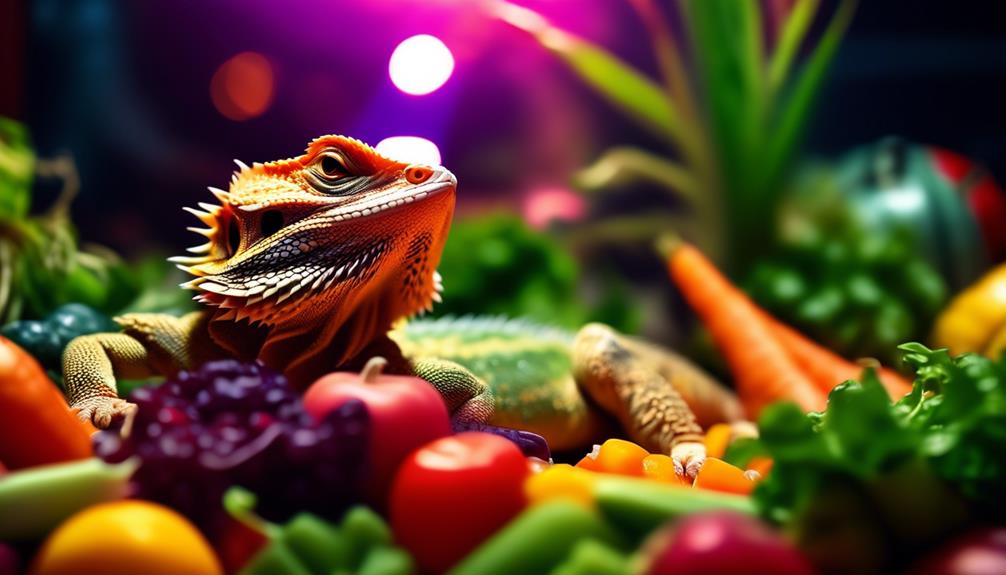
To ensure the overall well-being of your bearded dragon and minimize the risk of health issues, proactive measures can be taken to prevent and address potential concerns.
Monitoring behavior is crucial in identifying any unusual changes that may indicate underlying health problems. By observing your dragon's activity level, eating habits, and overall demeanor, you can quickly recognize signs of laziness or lethargy, which may be indicative of common ailments.
Additionally, addressing common ailments such as respiratory infections, metabolic bone disease, and parasites is essential for maintaining your dragon's health. Regular veterinary check-ups and proper hygiene practices can help prevent these issues from arising.
Frequently Asked Questions
How Often Should I Feed My Bearded Dragon?
We feed our bearded dragon multiple times a day as hatchlings, gradually decreasing to once a day as adults. Calcium supplementation is essential, dusting food with calcium powder every other feeding and providing a calcium block in the tank.
Can Bearded Dragons Get Sunburned?
Yes, bearded dragons can get sunburned if not properly protected. Preventing sunburn in bearded dragons is crucial, and UVB lighting plays a vital role in their health. It's important to provide them with the right conditions to thrive.
What Is the Average Lifespan of a Bearded Dragon?
The average lifespan of a bearded dragon is around 10-15 years. Common health issues include metabolic bone disease, respiratory infections, and parasitic infections. Regular veterinary check-ups and a balanced diet can help ensure a long and healthy life.
How Do I Know if My Bearded Dragon Is Too Hot or Too Cold?
If your bearded dragon is too hot or too cold, signs of temperature discomfort may include seeking out cooler or warmer areas, lethargy, or abnormal behavior. The best ways to regulate their temperature are through proper heating and lighting setups in their habitat.
Can Bearded Dragons Eat Fruits and Vegetables?
Yes, bearded dragons can eat fruits and vegetables as part of their diet. Some of the best fruits for bearded dragons include berries, melons, and papaya. It's important to offer a variety of nutritious options to ensure their health.
Conclusion
In conclusion, a vibrant and active bearded dragon is a symbol of good health and happiness. By closely monitoring their behavior, appearance, and oral health, we can ensure that our scaly companions are thriving.
Making necessary changes in their care and seeking veterinary attention when needed is essential in preventing and addressing health issues.
Let's continue to be responsible caretakers and provide our bearded dragons with the love and attention they deserve. Together, we can keep our reptilian friends vibrant and active for years to come.
